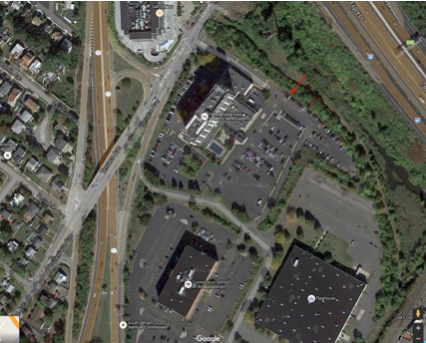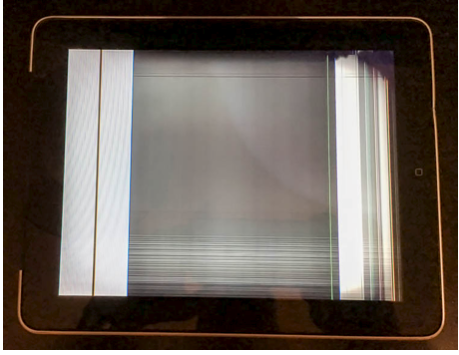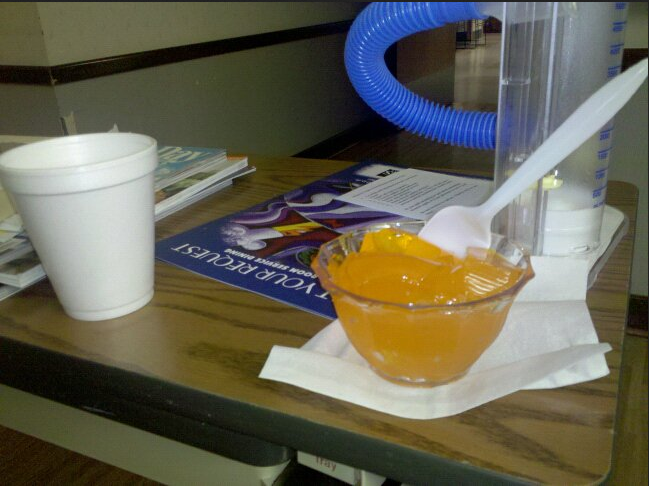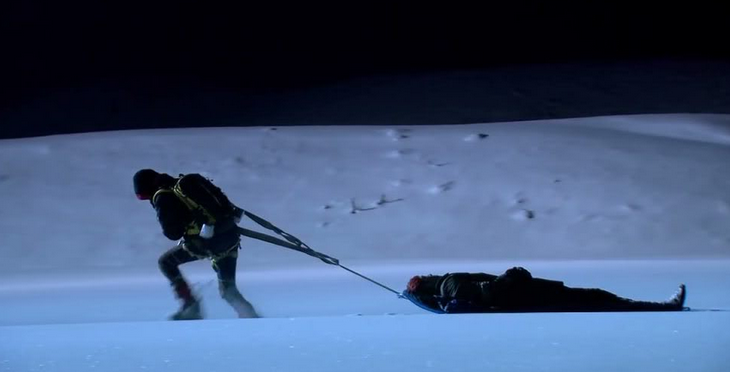
I Ran over My iPad, My Mother Died, Then the Shit Got Real:
An illustrated autobiographical tragicomic novella in 10 chapters
by Steve Eilenberg
Part 6: I Ran Over My iPad
I scabbed together a few more days to fly back to New Jersey. Last minute scrambling bought me an expensive ticket to Kennedy Airport, late at night. I took the tram to the rental center and tried to remember if I had reserved Avis, Hertz or Budget. Budget sounded right, so I went to fetch my car. They had no reservation for me. I couldn’t find my reading glasses and my iPhone had run out of power. I fetched my iPad and looked for the e-mail confirmation. It was nowhere to be found. I tried Avis, then lucked out at Hertz. It was sleeting with penetrating cold. With an iPad on my lap, I ask Siri to get me to Hackensack.
Me: “Hey Siri?”
Siri: “Beep Beep”.
Me: “Take me to Hackensack”.
Siri: “I’m sorry… I didn’t quite get that”.
Me: “Hackensack…take me Hackensack”.
Siri: “What is a fact?”
Me: “Hackensack. Hackensack!”
Siri: “You want to play Hacky Sack?”
Me: “Just take me to the nearest hospital”.
Siri:“Are you feeling ill…Steven?”
Me: “No, my mother is dying”.
Siri: “That doesn’t sound good…Steven”.
I couldn’t safely pull to the shoulder to look at the map, as there was heavy traffic, and the sleet was starting to stick, making the road quite slick. I opened ‘maps’ and gutted my way to the turnoff for the Hasbrouck Hilton. Flustered, I pulled into a peripheral lot that turned out to be employee parking. I dragged my carry-on bag to the reception desk and checked in. The room had a freeway view, all too common in this part of New Jersey. I looked for my iPad to e-mail Marie that I had arrived, but couldn’t find it. The blotter at the front desk was black, as was my iPad, so I headed down, thinking I left it there. Not there! I took a cold, wet hike out to the rental car and decided to move it closer, to the actual guest lot. I looked on the passenger seat. Not there. The floor. Not there. The trunk is black…Not there. The door compartment? Not there. I went back to the room; I must have overlooked it there after all. Not there!
I found a charger and revived my iPhone. Still without reading glasses, I squinted while firing up “find my devices” and it showed me a satellite view of the employee parking lot with an ‘X’ exactly where I had parked previously. Oh, I think, it must have dropped. Funny, I didn’t hear it drop! Am I that preoccupied? Of course I am. I follow my fading tire tracks in the deepening slush. This is where I found my iPad…with slushy tire tracks all over it! The case was wet, but the device dry. The screen was unbroken. Fantastic! I ran over my iPad and it lived to tell about it? Do I even tell Marie about it? Triumphant, I brought it back upstairs and in the warm dry room, push the start button. The screen partially filled with ‘vertical blinds’. I took a shot with my iPhone, then it went black forever. Hoping a quick charge might defibrillate it back to life, I start charging it. Again, the blinds. I texted Marie “I ran over my iPad…don’t ask!” and went to bed.
(Hasbrouck Hilton aerial view of parking lot. Red arrow shows where iPad was found)
The next morning, with coffee and a scone in hand, I went to Mary’s room. We were alone. Her roommate was loudly gurgling. I gave Mary a kiss, squeezed her swollen and chapped hand and sat down in a baby poo yellowish-brown sticky visitor’s chair. We gave each other half smiles and sat for a while in silence. I had no iPad to fall back on and decided not to mention the iPad incident. On her tray was sweating jello, apple juice and a water with a foil cover. She could not reach these morsels, even if she were desperate and if placed in her hand, she couldn’t open them. Our peace was broken by her returning abdominal cramps and I called the nurse for bedpan assistance. This was a hemodialysis day. They drew some blood and did another finger stick for her glucose. No blood was forthcoming. Not a good sign. At least Sarah and I got them to discontinue her cholesterol lowering medication, which seemed just silly at this point. One pathetically small victory for Camp M.
Mary’s brow furrowed and she looked me in the eye. Eventually, she said, “Steven, I’m done. I’m done with all of this.. Is it wrong? Wrong to call it quits?”.
I pause a bit, impressed by her strength and clarity, but horrified.
Me: “Has anything changed?”
Mary: “No, but that’s the point. I’m never going home. They want to put a fistula in and I don’t think I want it”.
Me: “When do they want to do it?”
Mary: “Tomorrow”.
Me: “Did you discuss this with anyone? Any of your doctors? Does D know?”
Mary: “Not yet.”
Me: “OK, let’s think this through. Best case scenario, the dialysis fistula surgery goes well and in a while, they can use it and take out your uncomfortable chest catheter. Hopefully your bowel behaves and heals up and they can stop giving you blood transfusions. You are on dialysis for the rest of your life. It will be a long haul at a skilled nursing facility and with some rehab, the next stop will be a long stay in a nursing home”.
Mary: “I don’t want any of that”.
Me: “You’ve seen a psychiatrist here. They put you on some antidepressants. Do you feel any different? Any better?”
Mary: “I’m not happy, but this isn’t depression, Steven”.
Me: “I understand. Should you wait a while longer and see if you feel differently?”
Mary: “I don’t think so. I don’t want this thing. The fistula. I don’t want dialysis. I really hate it.”
Me: “You’re getting dialysis today…are you going to refuse?”
Mary: “Maybe…I don’t know”.
Later that morning, they picked her up for dialysis. She came back exhausted and cold, and had another bout with cramps and the bloody bedpan. She passed on the sugar free jello.
Camp M managed to get her a chocolate milk shake. Later that evening, Sarah notices that several pressure ulcers are developing. This is another bad sign and speaks poorly of her care.
Sarah and I stay late into the evening. Sarah washed Mary’s hair and brushed her teeth. She is less energized this time, a clear sign that the fight is leaving her. Sarah and I leave for a dinner break and talk about Mary’s plan to stop dialysis. We rehash David’s comments that as the husband and doctor, he knows what’s best. We know this won’t end well. At the outset, Mary really didn’t have a choice over who had power of attorney, but things have changed now. The shit got real.
Late that evening, we have another frank conversation with Mary. She completely understands that no dialysis means death. She was rational and clear that the existence in store for her was unacceptable. She also knew that with David in charge, her wishes would be disregarded, especially as her renal failure starts making her fuzzy headed and legally incompetent. He would have her back on dialysis, with a fistula and, if he could manage it, with a colectomy. I imagine seeing Mary’s face if she survived all this, bedridden, hopeless, full of resentment and bedsores.
Mary’s only recourse was to reassign power of attorney to someone who would honor her wishes. Susan was back in Buffalo, leaving Sarah or me. Neither of us wanted to be in the crosshairs on this one, but it wasn’t about us. As callous as it sounds, I even thought of suggesting a coin flip. In the end, Sarah volunteered, as she lived closer. Mary’s roommate, on oxygen and in bad shape, but otherwise surprisingly sharp, had been listening to our conversation about end of life decisions, David and all. She readily agreed to witness reassignment of power of attorney to Sarah. My father was officially off the list.
David and K hadn’t yet made it to the hospital, which was a great relief. We didn’t want a showdown in front of Mary, which is what would have happened. Later that morning, she refused dialysis and the fistula. Soon after, David heard the news and calmly replied that she was getting dialysis and the fistula! I believe it was Mary’s day nurse who first told him that his youngest daughter, Sarah, was making decisions now. He blew up at this; I believe first calling and yelling at her, then again in person. It went horribly wrong. He told Sarah to stay out of it and that it was none of her business, then worse. She told him that he was an “angry and nasty old man. ” He retorted with “Is that all you got?” David and K alerted the hospital administration that they had a “big problem” on their hands and were going to be sued. There was also some talk about suing me and Sarah, but I didn’t hear this until later. The hospital’s risk management team sprang into action and a psychiatrist soon appeared to test my mother’s state of mind and competency. Her answers were slow and deliberate, but she passed.
In Susan’s words: “She has been wanting to stop all treatment for weeks, and he’s been opposing her, insisting day after day (despite her advance directive and her repeated declarations in the hospital) that he’d never heard of this wish of hers before. He and K tried and tried to have her declared mentally incompetent to override her wishes, and psychiatrists were constantly coming to ask her to spell words backwards, to describe in detail her logic, even while she was drugged and dry of mouth and barely able to speak. He has been violently abusive toward Sarah for her efforts to get M into hospice. I think it was that night, at least around this time that Sarah, Aaron and I worried that David was in such a state where he might come to the hospital with his guns and start shooting doctors and nurses.”
To digress just a bit, David’s history with guns should not inspire confidence. He “taught” me to shoot when I was 8. He took me to the basement, my then bedroom, pushed cotton-balls in my ears and handed me a loaded revolver. We took turns shooting a hand drawn target on a bare cinder-block wall. Debris would ricochet back at us and my ears would ring for days but the heady smell of gunpowder was strangely alluring. Years later, he almost shot Sarah with his shotgun, hearing noise one night in the garage when she returned late one evening. Being locked out, she was planning to spend the night in his car. Over the years, he had threatened to kill one of Susan’s early boyfriends (a salesman at Sam Goodys) and a late childhood frenemy of mine who was a “bad seed”. In fairness to him, there was no follow through.
With D’s gun history, we were in a bit of collective panic. Sarah, Aaron and Susan drove in light snow to 928. The locks had been changed, but they had an alternate way in. Once inside, Aaron found David’s bedroom closet, which housed his revolvers and shotgun, locked. Aaron, an ex-marine and firefighter, was able to jimmy the closet with minimal visible damage. We thought that if he never went searching for his guns, there was no reason for him to ever again open this closet. After all, he no longer wore wingtip shoes, suits or ties. Aaron found no guns. No ammunition. Nothing. It was curious. With the snowstorm tapering, they now noticed telltale footprints on the walkway! Aaron got a branch with some leaves on it and tried to cover up the tracks to the house. But now, it looked as if three people had dragged away a dead body.
Soon after, Sarah and I headed off to check out a nearby acute care hospice. Places like this mostly serve patients with less than a week or two to live who are too sick to return home. Hospice House of Hackensack was clean and quiet and the nurses seemed compassionate. There was an unremarkable view from the room, and the food looked lousy, but as the director told us, their patients are generally not eating or looking at the view. She assured us that they would keep Mary clean and comfortable and that dying of renal failure was “not a bad way to go”.
The D camp was on a rampage, leading to another psychiatric assessment for Mary. Answers came even slower and more deliberate, but she passed again. Mary had entered the early official stages of “dying’. Later that same day, a well-meaning rabbi affiliated with the hospital came by to visit. While not particularly religious and actually a convert to Judaism, Mary found him to be a welcome comfort. David scowled throughout the visit as if the rabbi was in some way inviting Mary to die. Still in earshot, as the rabbi was leaving the room, David said to no one in particular: “How many months pregnant do you think that guy is?”




Keep writing, I know the ending but what a literary journey. I am reading Roz Chast’s book after finishing ‘Fun House’, you are a perfect compliment to them. Thanks. s
So sensitively written SE. You may take some comfort in knowing I also had 2 car “incidents” this year, both related to my mother. One, a “bumper tap” after talking to my dad about my mother being in a nursing home. Two, after returning from seeing my mother, cried like a baby when i left her , backing into a pole and crushing my rear view mirror. It’s disturbance on the deepest level.
I find the story something that most people will deeply relate to. Challenges encountered with aging parents as well as the amplification of sibling disharmony that comes with that is something many have experienced.
The story is hilarious in parts but at the same time very deep and compelling. Add to that the intensity that Is obviously there.
Bottom line is the story really makes you think about oneself, family, perspective on life and the process of aging and the challenges involved. I am very moved by it.
Thanks so much for writing it and sharing it. You are “putting yourself out there” which is bold and I very much respect that.
So much of this reminds me of my Dad’s last few weeks. The difference is that among his three surviving children, I was the only one there to discern all the medical, emotional, physical, and end of life issues.
The good news is that I got to avoid that extra level of sibling input and disturbances ( all that came later when they wanted to know where his money was). I got to just be present with my Dad and to the process
– a blessing beyond measure.
Not sure how to access parts 7-10…
Hi, If you just type iPad into the search function you will find links to the whole series.
-Marie